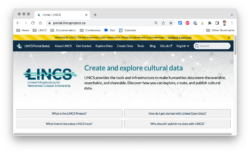Linked Infrastructure for Networked Cultural Scholarship
Human brains work through a vast web of interconnections, but the web that researchers increasingly use to understand human culture and history has few meaningful links. LINCS will create the conditions to think differently, with machines, about human culture in Canada.

LINCS serves Canadian researchers by interweaving data from fields including history, communication, music, performance, and literary studies to transform how we engage with culture online.

LINCS will enable deep contextualization and new ways of understanding, empowering researchers and the public with the means to engage more effectively with a vast array of digital cultural content.

LINCS collaborates with stewards of cultural data collections and development partners committed to exploring the potential of Linked Open Data to contribute to a better open knowledge ecology.

LINCS benefits from and contributes to Canada’s national network of expertise in research software development, research computing infrastructure, and research data management.
Linked Open Data for Canadian Cultural Research
LINCS is converting and interlinking Canadian cultural research datasets, making them accessible as Linked Open Data for the benefit of scholars and the public.
 What
What
The LINCS infrastructure project will convert large datasets into an organized, interconnected, machine-processable set of resources for Canadian cultural research.
 Why
Why
LINCS aims to provide context for the cultural material that currently floats around online, interlink it, ground it in its sources, and help to make the World Wide Web a trusted resource for scholarly knowledge production.
 Who
Who
With a team of technical and domain experts, LINCS will allow Canadian scholars and partner institutions to play a significant role in the developing the Semantic Web.


 Ice cream, Binaries, and Maybes
Ice cream, Binaries, and Maybes
 Piecing the Past Together With LOD
Piecing the Past Together With LOD
 Writing in Circles: From Beginner to Expert and Back Again
Writing in Circles: From Beginner to Expert and Back Again
 Stand-ups for Software Development
Stand-ups for Software Development